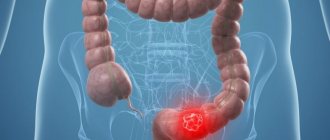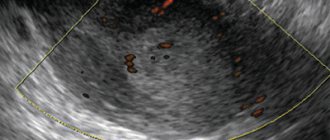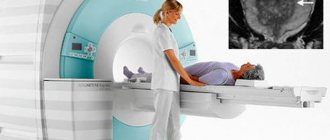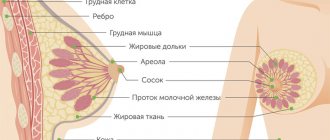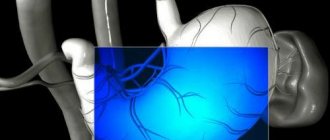Bowel cancer has a second name – colorectal cancer. Malignant neoplasms most often develop in the rectum, sigmoid, descending and ascending colon. Less commonly, pathology is detected in the transverse colon, cecum, appendix and small intestine. At the Yusupov Hospital, early diagnosis of intestinal cancer is carried out using the latest diagnostic procedures and precise laboratory diagnostic methods.
When a malignant intestinal tumor in the form of cancer is detected at the initial stage of the oncological process, doctors at the oncology clinic carry out complex therapy. It includes the following components:
- Innovative surgical interventions;
- Chemotherapy with the most effective drugs that have a minimal range of side effects;
- Radiation therapy using the latest equipment, which allows targeted action on the tumor without damaging surrounding tissue.
If it is not technically possible to perform a radical operation, palliative surgical interventions are performed.
Causes of bowel cancer
The causes of colon cancer are still under study. There are certain factors that can increase the likelihood of developing cancer. These same factors influence how long bowel cancer takes to develop. These factors include:
| Causes | Description |
| Heredity | A genetic predisposition to developing cancer automatically puts a person at risk. If there is a family history of cancer, a person needs to be especially careful about his health and treat diseases in a timely manner. |
| Various intestinal diseases | The development of cancer is often preceded by inflammatory and tumor diseases of the intestinal mucosa: polyps, adenomas, Crohn's disease, ulcerative colitis. These diseases are not malignant, but can create conditions for the appearance of cancer cells. |
| Poor nutrition | Eating too fatty foods, large amounts of simple carbohydrates, and lack of fiber foods leads to constipation. Dense feces can disrupt the integrity of the intestinal walls, causing microcracks and disrupting its function. This can lead to the degeneration of healthy cells into malignant ones. |
| Bad habits | Cigarettes, alcohol, and drugs are carcinogens and provoke cell degeneration. |
| Environmental influence | A polluted atmosphere and constant contact with harmful substances (asbestos, mercury, etc.) can cause cancer of various organs and systems. |
How long intestinal cancer develops is an individual question. This will depend on the general health of the person and the intensity of the influence of the provoking factor.
How to properly prepare for research
Before performing an ultrasound of the intestines or before a colonoscopy, patients will have to follow certain recommendations of a similar nature:
- a few days before the study, patients need to exclude from their diet any foods that cause increased gas formation;
- approximately 24 hours before the examination, food intake should be minimized and dinner should be replaced with a light snack;
- in the evening or early in the morning you need to empty the intestines of feces. If this cannot be done naturally, then you should definitely resort to a cleansing enema.
- In order to fully cleanse the intestines, absorbent drugs can be very effective, such as:
- "Enterosgel";
- "Smecta";
- "Polysorb".

Before the study, experts also advise taking medications to reduce gas formation. Compliance with all preparatory measures will guarantee a highly informative survey.
Stages of bowel cancer
There are 4 stages of colon cancer. They differ depending on the degree of disease progression and clinical manifestations. At stages 1-2, symptoms are invisible to the patient, although at this time the oncological process affects more and more healthy tissue. This is the complexity of bowel cancer. The patient consults a doctor at stages 3-4, when the disease is already very difficult to cure.
Clinicians distinguish 4 stages of intestinal cancer:
- At the first stage of cancer, the disease does not manifest clinical symptoms. The patient attributes minor signs of intoxication to a common malaise. A small, dense formation forms on the intestinal mucosa or under the mucous membrane. There are no metastases to the lymph nodes.
- At the second stage of cancer, the tumor blocks the intestinal lumen by a third or half. The lymph nodes closest to the tumor may be affected, but there are no distant metastases.
- The third stage of intestinal cancer is manifested by disruption of the intestines, which forces a person to see a doctor. A malignant neoplasm blocks the intestinal lumen completely or by one third. Atypical cells are detected in lymph nodes distant from the tumor. There are no metastases.
- In the fourth stage of cancer, intestinal perforation, acute intestinal obstruction, and intestinal bleeding may develop. Multiple metastases are observed. The body is intoxicated with tumor decay products.

Questions and answers
Is there a cure for colon cancer?
Treatment for colon cancer is most successful when the disease is detected early. Therefore, it is necessary to regularly undergo preventive examinations with a gastroenterologist and consult a doctor if any intestinal symptoms appear.
How does colon cancer manifest?
The onset of cancer is often asymptomatic, since a colon tumor does not have obvious signs. It is necessary to monitor your condition and periodically examine your stool. If bloody impurities or a large amount of mucus appear in them, you should consult a doctor for examination.
How to identify colon cancer?
It is impossible to determine the presence of colon cancer on your own. It is necessary to contact an oncologist, gastroenterologist or proctologist, who will prescribe the necessary diagnostic tests. Based on their results, it will become clear whether you have cancer or not.
Attention! You can cure this disease for free and receive medical care at JSC "Medicine" (clinic of Academician Roitberg) under the State Guarantees program of Compulsory Medical Insurance (Compulsory Medical Insurance) and High-Tech Medical Care. To find out more, please call +7(495) 775-73-60, or on the VMP page for compulsory medical insurance
Symptoms of bowel cancer
Colorectal cancer has many clinical manifestations, which sometimes causes diagnostic errors. The professionalism of doctors who first encounter a patient plays a major role in identifying colon cancer at an early stage. Symptoms of the disease include the appearance of blood in the stool, pain or discomfort in the abdomen, diarrhea, and weight loss. The symptoms of intestinal tumor development are similar to the symptoms of chronic digestive disorders and symptoms of other diseases - this often becomes the reason for late diagnosis.
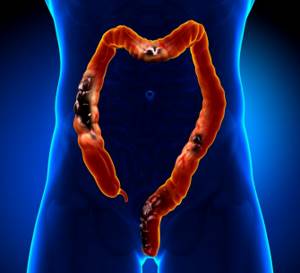
At an early stage of the disease, patients complain of chronic fatigue, rare or frequent urge to defecate. In a blood test, the number of red blood cells and hemoglobin decreases. Initially, therapists cannot determine the causes of progressive anemia. Due to the fact that the symptoms of intestinal cancer are similar to those of other diseases that cause chronic digestive disorders, doctors often fail to make an accurate diagnosis in a timely manner. If the tumor blocks the intestinal passages, intestinal obstruction develops. It is manifested by the cessation of the passage of feces and gases, and bloating of the intestines. Signs of an “acute abdomen” develop. In this case, surgeons perform urgent surgery.
The first signs and symptoms of bowel cancer at an early stage
The severity of bowel cancer symptoms increases as the tumor grows and spreads. The first signs of intestinal cancer at an early stage almost do not attract the patient’s attention and are weakly expressed. Pathological signs that indicate the development of a malignant disease are the appearance of mucus and blood in the stool.
At the beginning of the tumor, blood is released in the form of streaks, then the amount of blood in the stool increases, clots appear, sometimes with a foul odor. The color of the bloody discharge ranges from dark to almost black. Very often, patients with intestinal cancer develop tachycardia in the initial stages of tumor growth.
Manifestations of intestinal cancer depending on its type
Morphologists distinguish the following histological types of intestinal cancer:
- Adenocarcinoma;
- Carcinoma;
- Lymphoma;
- Sarcoma.
Adenocarcinoma is most often localized in the colon. It is manifested by rapid fatigue, increased body temperature, constant constipation, and intense abdominal pain.
If you have intestinal carcinoma, patients experience pain and a feeling of fullness in the abdomen, constipation or diarrhea. Their appetite worsens, mucous and bloody discharge from the anus appear.
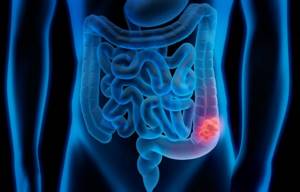
Intestinal lymphoma is manifested by lack of appetite, nausea, bloating, and chronic fatigue. In patients, the formation of gases in the intestines increases, body temperature rises, and anemia develops.
Sarcoma is characterized by stool disorders, heartburn, and blood in the stool. Patients are concerned about pain when passing stool through the intestines, intense pain in the lower abdomen, periodic pain that occurs after taking an uncomfortable position or eating.
How is ultrasound diagnostics and colonoscopy performed?
Many patients believe that undergoing an ultrasound of the intestine is a study during which a specialist will perform exclusively external manipulations, as is done when examining many organs. An intestinal ultrasound is performed a little differently.
First of all, a special catheter is inserted into the patient through the rectum to a depth of 5 cm. Its diameter is very small and does not exceed 8 mm. With its help, a special liquid is introduced into the intestine - a contrast agent, the purpose of which is to better visualize the walls of the organ.
During the examination, the patient does not experience pain. This diagnostic procedure is not very different from other types of ultrasound examinations.
As for colonoscopy, this is a much more unpleasant and sometimes even quite painful procedure. During the examination, a special device is inserted into the patient's intestines through the anus - an endoscope, which is a flexible tourniquet with a camera at the end.
For a complete examination of the intestines, the specialist will need to insert the endoscope deep enough, which causes pain to the patient. Another significant disadvantage of endoscopy is that it takes much longer to perform than ultrasound diagnostics.
Bowel cancer in women and men
Signs of intestinal cancer in men and women are equally common; they are only slightly inferior to breast cancer in women and stomach and lung cancer in men.
The first signs of bowel cancer in women
In women, oncologists more often detect colon cancer. Symptoms of bowel cancer in women can appear at any age, but the risk of developing it increases after 40 years of age. The highest percentage of cases is observed in people aged 60 years and older.
The most common cause of colon cancer in women is the degeneration of intestinal polyps. The tumor most often occurs in women with a family history, leading a sedentary lifestyle, and eating a lot of meat (especially beef).
Symptoms of the disease appear two years after the onset of the pathological process. Patients are concerned about abdominal pain, bloating, and stool disturbances. As the disease progresses, the tumor metastasizes to the lymph nodes, vagina and other organs.
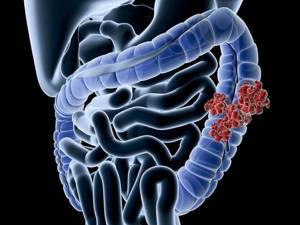
In the early stages of bowel cancer, symptoms and manifestations in women do not differ from those of cancer in men. Constipation appears, pain can radiate to the rectal area. Later manifestations of intestinal cancer are characterized by stool incontinence, severe pain in the intestinal area, pain may occur in the vaginal area, anus.
Vomiting develops and urogenital fistulas appear. Metastasis of the tumor to the bladder area is manifested by new symptoms - changes in urine. The urine becomes cloudy and smells like feces. Due to constant bleeding, anemia develops, and severe bladder and kidney diseases can develop.
Women may additionally experience menstrual irregularities and changes in taste preferences.
Causes and symptoms of bowel cancer in men
Rectal cancer is more common in men. The disease is easy to diagnose, but due to the fact that its symptoms resemble those of other intestinal pathologies, patients seek medical help late. The reasons for visiting a doctor are as follows:
- Blood on the surface of the stool;
- Changes in the shape and consistency of stool;
- Pain in the anus;
- Diarrhea or constipation.
Symptoms of colon cancer in men are classic and combine gastrointestinal dysfunction, but metastasis often affects the prostate.
With a digital examination, proctologists determine a tumor-like formation. The most common cause of intestinal cancer in men is smoking, alcohol abuse, and culinary preferences (eating fatty, spicy, fried foods). Colon cancer in men can develop against the background of intestinal polyps, ulcerative colitis, obesity, and untreated hemorrhoids.

Diagnostics
Since symptoms of colon cancer can easily be confused with signs of other intestinal diseases, it is necessary to confirm the presence of a tumor using laboratory and instrumental studies.
- Fecal occult blood test. Three consecutive portions of stool are examined for the presence of blood.
- Colonoscopy. Endoscopic examination of the intestine is performed using a flexible probe with a video camera attached to the end. The gastroenterologist examines the mucous membrane, assesses its condition, and detects pathological areas. The equipment allows you to perform a biopsy of altered tissue for research.
- Histological analysis of the biopsy specimen. Microscopic examination of specially prepared tissue sections allows us to determine the type of cancer cells and their degree of malignancy.
- Blood test for tumor markers. As a rule, in case of rectal cancer, a specific carcinoembryonic antigen is determined.
- Irrigoscopy. An X-ray examination of the large intestine is carried out with filling with a contrast solution and makes it possible to identify deformations, obstructed areas and other pathologies.
- Abdominal ultrasound is performed to assess tumor spread and metastases.
- MRI of the intestine is prescribed to clarify the size of the tumor, its location, depth of germination and other features.
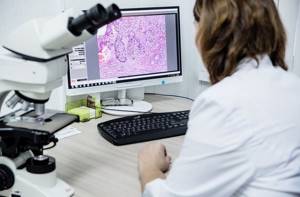
Attention!
You can receive free medical care at JSC “Medicine” (clinic of Academician Roitberg) under the program of State guarantees of compulsory medical insurance (Compulsory health insurance) and high-tech medical care.
To find out more, please call +7, or you can read more details here...
Metastases
In colorectal cancer, the liver is often the first site to metastasize. This occurs at the 4th stage of the disease. The prognosis of stage 4 intestinal cancer with metastases will depend on the degree of damage to tissues and organs. If you undergo treatment and follow the doctor’s recommendations, the patient can live for about 2 more years.
Metastases of stage 4 intestinal cancer can affect the retroperitoneal space and peritoneum, pelvic organs, pancreas, bladder, and lungs. Adverse symptoms of intestinal metastases will be as follows:
- Tumor growth into fatty tissue;
- Perforation of the colon;
- Spread of cancer cells to neighboring organs;
- The presence of cancer cells with a low degree of differentiation.
Diagnosis of bowel cancer
Accurate diagnosis of intestinal cancer is very important in order to develop adequate effective therapy. At the Yusupov Hospital, oncologists diagnose intestinal cancer using modern equipment with high resolution. The patient's examination begins with a digital examination of the rectum. This simple diagnostic method allows you to detect colorectal cancer.
Then gastroenterologists use X-ray and endoscopic research methods: sigmoidoscopy, colonoscopy. During sigmoidoscopy, the doctor examines the mucous membrane of the rectum. In some cases, the distal sigmoid colon is examined. Colonoscopy is used to evaluate the condition of the colon. During an endoscopic examination, the surgeon performs a biopsy of the detected tumors. Fragments of pathologically altered tissues are sent for histological examination.
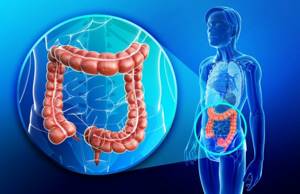
For early diagnosis of intestinal cancer, the Yusupov Hospital determines the level of tumor markers - protein compounds that are produced in the body during the development of the tumor process:
- CA19-9, CA 72-4, LASA – P – markers of gastrointestinal cancer;
- CA 125 – allows you to identify neoplasms of the sigmoid colon;
- CYFRA 21-1 – is formed in the presence of rectal cancer.
- SCC - allows you to detect squamous cell carcinoma of the anal canal.
- CA 242 - determined in the case of rectal and colon cancer.
- AFP – formed in tumors of the rectum and sigmoid colon;
- CEA is a sensitive marker of colon cancer.
Using tumor markers, bowel cancer can be suspected before clinical manifestations of the disease appear.
Make an appointment
Kinds
Histological classification of colon cancer includes the following types:
- adenocarcinoma (up to 80% of cases), which, in turn, is divided into subtypes according to the degree of cell differentiation;
- mucinous (mucous, colloidal), where the tumor is a mucous formation in which malignant cells float;
- signet ring cell, formed by large cells with a displaced nucleus, giving them the shape of a ring;
- squamous;
- glandular-squamous;
- undifferentiated type of tumor.
How is bowel cancer treated?
Treatment for bowel cancer is complex. It includes surgery and subsequent chemotherapy, radiotherapy or radiation therapy, as well as rehabilitation. The many years of experience of oncologists at the Yusupov Hospital helps achieve optimal treatment effects even in the most difficult cases.
Treatment methods for bowel cancer are:
- Surgical intervention. The operation can be performed using the abdominal (open) method, as well as minimally invasive methods: endoscopy, laparoscopy, radiosurgery (gamma knife and cyber knife). The choice of treatment method will depend on the stage of the disease, the location of the tumor, and its size. The prognosis after surgery for intestinal tumors is significantly improved, since the likelihood of metastasis is reduced;
- Radiation and radiotherapy therapy for intestinal cancer. Prescribed to stop the growth of malignant cells and the progression of the disease. Can be used before and after surgery;
- Chemotherapy for colon cancer. Treatment uses a number of drugs that cause cancer cell death. These drugs also negatively affect healthy cells, which is why chemotherapy has many unpleasant side effects (hair loss, constant vomiting). To support the body, immunostimulants are prescribed in parallel.
With proper treatment, patients have a significantly increased chance of prolonging their lives.
Forecast
With a tumor (adenocarcinoma, carcinoma, sarcoma) of the intestine, life expectancy will depend on the scale of development of the oncological process. The prognosis of intestinal cancer directly depends on the stage at which treatment was started. Additional factors may also influence the results of therapy:
- Patient's age;
- The state of his body;
- Response to treatment;
- Accompanying illnesses.
The prognosis for intestinal adenocarcinoma and other malignant tumors that disrupt the functioning of the gastrointestinal tract and the entire body is usually considered within the framework of five-year survival after successful therapy. Depending on the stage, the prognosis for adenocarcinoma, sarcoma and intestinal carcinoma is:
- First stage: 95%;
- Second stage: 75%;
- Third stage: 50%;
- Fourth stage: 5%.
Cancer treatment methods are constantly being improved, which significantly increases life expectancy after therapy.
Risk factors for colorectal cancer
K. V. Puchkov: “Oncological disease is not a death sentence”
Colon cancer almost always occurs against the background of changes in the mucous membrane.
Precancerous diseases play a major role in the origin of the disease:
- rectal polyps,
- familial hereditary diffuse polyposis,
- chronic proctitis,
- nonspecific ulcerative colitis,
- proctosigmoiditis,
- anorectal fissures,
- fistulas, ulcers, etc.
Polyps belong to the group of obligate precancerous diseases. The likelihood of a polyp transforming into rectal cancer is very high.
Most researchers consider the possibility of developing colon cancer to be more likely in the presence of adenomatous polyps. The risk of malignant transformation of polyps is estimated at 3-20%, and it increases significantly with increasing size of the formations, amounting to 40-85% for polyps with a diameter of more than three cm. The incidence of cancer in large adenomas is proportional to the increase in their size, but there is no linear relationship. The likelihood of malignancy in large adenomas increases sharply when they exist for 10 years.
An alternative concept has also been put forward, according to which most cancers in the colon develop “de novo”, so colon cancer cannot be prevented by polypectomy alone, since malignant potential can be contained even in visually unchanged colon mucosa.
There are very conflicting opinions about the frequency of malignancy of adenomas depending on their histological structure. Some authors believe that villous adenomas most often become malignant, without mucus formation, others consider tubular-villous adenomas, and others do not note significant differences in the frequency of malignization of tubular-villous and villous adenomas.
The metastatic potential of large adenomas with elements of invasion has not yet been sufficiently studied. During surgical treatment of malignant adenomas with a diameter of more than 4.0 cm, metastases to regional lymph nodes or distant metastases were detected in 51% of cases.
Prevention
There are currently no drugs that can prevent colon cancer. Prevention of malignant tumors consists of a set of measures:
- Giving up bad habits;
- Rational nutrition;
- Moderate physical activity;
- Chronic disease control;
- Eliminates overwork and stress.
To prevent relapse, it is important to follow a balanced diet for bowel cancer. Nutrition for intestinal oncology should include all microelements and vitamins for normal functioning of the body. The diet for intestinal cancer includes a large amount of foods containing fiber (fruits, vegetables, whole grains) to avoid stagnation in the intestines. Products with dyes and other artificial fillers, high fat content, and simple carbohydrates should be excluded from the diet. A diet for intestinal cancer will improve digestion, which will significantly improve a person’s well-being.
Recommendations for the treatment of bowel cancer
In Moscow, successful treatment of intestinal cancer is performed at the Yusupov Hospital. This is a multidisciplinary medical center that specializes in the treatment of cancer and rehabilitation of patients. The hospital has created a special department - an oncology clinic, where the best specialists in Moscow work, treating cancer of any location and stage. Highly qualified and extensive experience of doctors, modern equipment allow us to treat intestinal cancer of any complexity and achieve maximum results.
Make an appointment
Intestinal diseases
Pathological conditions of the gastrointestinal tract are accompanied by a deficiency of nutrients, which affects the vital organs and systems of the human body.
Intestinal diseases are classified depending on the etiology, location and nature of the lesion. The most common are:
- inflammatory changes in the mucous membrane (enteritis, colitis, Crohn's disease, etc.);
- oncological processes (benign and malignant neoplasms);
- erosions, gastric and duodenal ulcers;
- parasitic diseases (helminthiasis, amoebiasis, etc.);
- irritable bowel syndrome (IBS);
- congenital pathologies (diverticula, stenoses);
- innervation disorders (Hirschsprung's disease, idiopathic megacolon);
- intestinal obstruction (mechanical and dynamic);
- vascular pathologies (hemorrhoids, Behcet's disease, mesenteric ischemia, etc.);
- traumatic injuries.
One of the common complications of intestinal diseases is the development of adhesions. Pathological changes are localized at the site of damage to the peritoneal epithelium. Adhesions are overgrown connective tissue strands that disrupt the functioning of the digestive system.
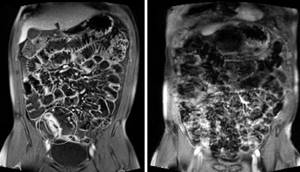
Crohn's disease on magnetic resonance imaging (affected area highlighted)
The following symptoms are reasons to check your intestines using MRI:
- pain in the epigastric and iliac regions of a pulling, cutting, spastic nature;
- long-term changes in stool (diarrhea, constipation);
- frequent nausea and vomiting for no apparent reason;
- pathological impurities in stool (pus, mucus, blood);
- loss of appetite, sudden weight loss.
Intestinal infections are accompanied by fever, weakness, chills, and deterioration in general condition. IBS is characterized by flatulence, corky stools, and severe pain in the iliac region.
When identifying intestinal diseases, MRI, CT, ultrasound and other types of hardware diagnostics, endoscopic and laboratory tests are used. Treatment of gastrointestinal pathologies requires an integrated approach, using both conservative and surgical methods.
